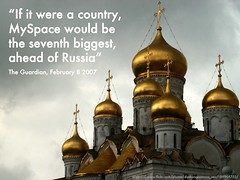
if it were a country myspace would be ahead of russia
That’s almost unbelievable. Well, when you think about it, MySpace and similar ‘countries’ have their own language and customs.
Originally uploaded by lynetter

Wes Fryer compares good teaching to good cooking. He talks about ‘recipes’ being modified in a Web 2.0 context to suit specific needs and situations. His six main ingredients for powerful teaching and learning are del.icio.us social bookmarks, Flickr photo sharing, VoiceThread digital storytelling, collaborative writing tools, websites for phone recording as well as SMS polling, and videoconferencing. How do these tools and applications differ from traditional 19th century teaching and learning? Replacing a one-way direction from teacher to student, where the teacher is the expert and the student a passive receptacle, these ingredients enable active and interactive learning.
I’m interested to find out more about the websites for phone recording and SMS polling. Are Australian teachers doing this?

If you click on the photo of the banned books banner, you’ll be directed to its Flickr home, and you’ll be able to hover over each book to discover what it is. An interesting theme – banned books.
Censorship. It takes me back to when, as an Australian of Russian descent, I attended a Saturday Russian language school (RS, we used to call it), during the time when our parents’ fear of Russian communism was raw. My own grandfather witnessed his father being shot at the age of six. The censorship that ensued at Russian School (RS), through the eyes of young people, took on a comical aspect. The more paranoid members of our community (am I being unkind?) decided to protect us from ‘evil’ by eliminating our exposure to all things Soviet (which means ‘council’, by the way). We spent our Saturdays drawn like moths to the flame, peering through thick black texta-covered chunks of text through the light, or trying to unstick glued pages. In most cases, our discoveries left us disappointed or confused when the forbidden words revealed themselves as ‘pioneers’ (soviet scouts) or the date of a celebration we weren’t supposed to know about. Continue reading Censorship
I realise that many people would have discovered ages ago what Hawkesdale College has been doing with blogging, but since I’ve only just looked through properly, I have to do my little rave because otherwise I’ll burst. It’s so fantastic!
The Hawkesdale K-12 blog : Techno7 (Our first year 7-12)
is about students and teachers blogging through the 7-12 school journey.
What’s on the blog?
• There’s a page for each subject, plus extras, eg. study skills, etc.
• Each student has a blog for each subject
• Each teacher has a blog following their Web 2.0 journey, posting stuff for students, or just ideas, findings, etc. Continue reading Bravo Hawkesdale